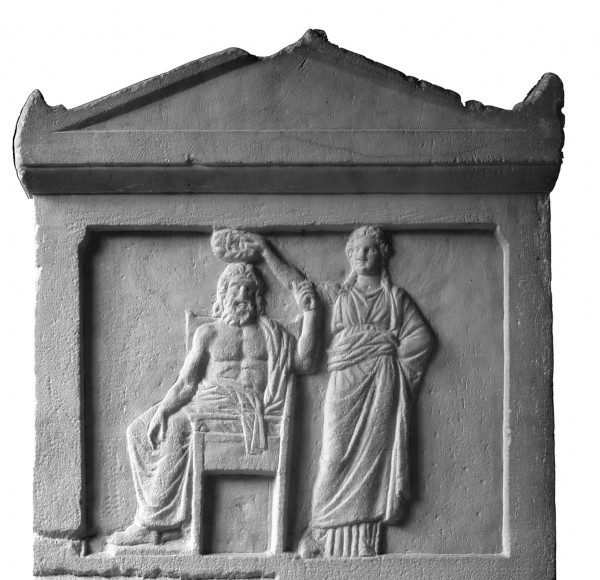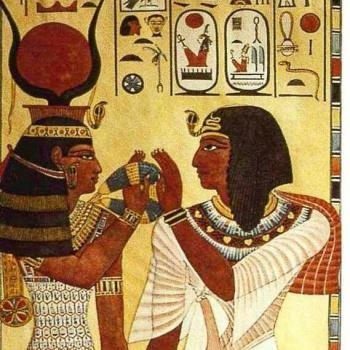
For the past few centuries Democracy is often cited as classical Athens greatest gift to the modern world. However, what went on in Athens does not bear much resemblance to what is practiced in 21st century America.
In modern times we are deeply grateful for the separation of church and state, indeed you frequently hear Pagans express wishes that it were more rigorously adhered to. In a sense classical Athens had separation of Church and State, in that Christianity was still centuries away from being created. Yet, most Athenians were quite pious, and their religious life was reflected in how proceedings were conducted. Sessions were often opened with curses upon any who might mislead the public in the days proceedings.
Starting around 500BCE, there was a deity specific to this new form of government, Demokratia, Not surprisingly her fame did not long outlast the use of that form of government. Athena, the city’s patron deity was not seen to be an advocate of this new form of government either, her influence preceded this era by several centuries – and the type of campaigns that were most closely associated with her were typically military, not political. If there was one of the Olympian gods which which had a special relationship with democracy, it was Hermes. Hermes was seen to have sway over communication and persuasiveness. Both of which are vitally important when you’re trying to speak to several hundred to a few thousand people (without amplification) and convince them of maters of civic import. Hermes’ cadueues was used as a 6ft tall “talking stick” so that the speaker wouldn’t be quite as lost in the crowd. Likewise, the first sign of real trouble for democracy was when one night a bunch of drunk rich boys smashed statue every statue of Hermes they could get their hands on. Most of these were in front of middle class homes to bring good fortune to travelers. This occurred immediately before a military venture against an ally of Sparta, which ended in disaster. A couple years later (411BCE) a group of young aristocrats brought in some Spartan mercenaries and set themselves up as a junta using the mercenaries as death squads against the previous elected leadership. After a few months the junta collapsed and Athens went back to a democracy only to revert again to oligarchy in 404 and 401 BCE.
Despite all the involvement of Hermes and Demokratia and the regular invocations and purification’s that took place – this actually was a big decrease in the involvement of religions in public affairs. The standard way that government was done in the world at that time was that you would have a king who was also simultaneously the head of state and high priest of the state religion, if not considered a god outright. The priests who conducted rites on behalf of the Assembly had no authority or privilege beyond what was need to conduct their duties. There vote counted the same as anyone else. If they got stuck on a jury they got the same lousy pay as anyone else.
There were limits to this smaller religious role. For instance, while being an atheist was not specifically illegal, teaching atheism, especially that the civic deities did not exist was considered a crime. The most famous instance of this was the case of Socrates who was tried, convicted and executed for this in 399 BCE. Socrates was not a fan of democracy, he refused to participate in it, and thought that the idea that the general public having any part of making governing decisions was an incredibly stupid idea. As a philosopher his students were the children of Athens wealthy aristocrats, most of whom were not particularly pleased about democracy either. His views were well known all over town, Aristophanes had been making fun of him in his plays for twenty-five years prior to his death. What turned public opinion of his anti-democrat views from harmless foolery to a judicial lynch mob? It’s what his students did. The revolts in 411, 404 and 401BCE that were listed above where young aristocrats came in with mercenaries and wiped out the local elected leaders. Well, the young men who lead those revolts were former students of Socrates. He never spoken against them, never suggested they step down, never indicated any regret that democracy had been overthrown. Perhaps if there had only been one instance of this, Socrates would never have been prosecuted. But after three times, people started connecting the dots and noticing who had taught these would be tyrants. And while no one could be found to ever suggest that Socrates advocated people taking up arms, or hiring mercenaries against the elected leaders – what they determined was that by his constant teaching against Athenian democracy he in effect was teaching atheism against the civic goddess Demokratia.
By this point the damage was done, after having had its democratic leadership wiped out three times in little over a decade, between Sparta, Macedonia and later on the Romans – Athens occasionally would revolt and have a few years of democracy, but it was always put down. In fact it never really had a stable democracy going until the last few decades, and with its current dire financial problems one might wonder about my use of the word ‘stable’.
When we look at our own version of democracy’s problems in dealing with monied interests I’m hoping that there’s some useful lessons we can find here, other than it can always get worse. What do you think?
—
Two books I found useful for this article:
“Greek Realities: Life and Thought in Ancient Greece” Finley Hooper 1967.
“The Trial of Socrates” I. F. Stone 1988. Mr. Stone was not a historian, but a famous investigative journalist who attempted to recreate the missing case for the prosecution. Fascinating reading!












